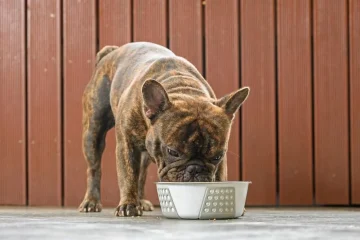Just like humans, dogs undergo notable changes throughout their years. While the shift from a playful puppy to an aged and calm one may be gradual, knowing when your dog enters its golden years will help you take great care of it.
But how will one officially know if your dog has reached the years of a senior? It is not as simple as just counting in “dog years,” as some vital elements like the breed size and underlying genetics, to the overall health condition, contribute massively.
This blog has ways by which you can decide if your dog is near senior status and things you can do to make their later years healthy and comfortable. Giving them senior dog treatsat that time would be okay as well.
What Age is Considered Senior for Dogs?
Another common misconception is that one dog year equals seven human years, which is far from reality. Dogs of various breeds tend to age at quite different rates. Smaller breeds usually outlast larger breeds and attain “senior” status when your dog has entered the last 25% of the expected lifespan for the species.
- Toy and small breeds (< 20 lbs): Breeds like Chihuahuas or Pomeranians are regarded as senior between 8 to 11 years of age.
- Medium breeds (20-50 lbs): At around 8-10 years, breeds like Cocker Spaniels and French Bulldogs enter their senior years.
- Large breeds (50-90 lbs): By 8-9 years, breeds like Labradors and Golden Retrievers are seniors.
- Giant breeds (> 90 lbs): Great Danes and Mastiffs usually become seniors by age 6-7.
While it is only a ballpark figure, it is essential to look for signs of ageing and consult a vet for any concerns. Senior dog food supplementscan help support your dog’s health as they enter the senior years of their life.
7 Signs Your Dog is Ageing
Greying Fur
The first and most noticeable of all the ageing signs in dogs is the greying or whitening of the hair, especially on the lips, face, and ears. Just as it happens in humans, with ageing dogs, the pigment in the hair follicle lowers, and this results in the greying effect.
Although it is natural, to many pet owners this appears to be the prime signal that your furry friend is not exactly the sprightly puppy he was any longer. The fur starts greying mostly at an age between 7 and 10 years, which varies with the breed and genetics.
Changes in Fur Texture
Your dog’s fur may change texture in addition to greying. A previously fine, shiny coat may become dry, harsh, or oily. The skin itself may become more sensitive, leading to a tendency to dryness, flakiness, and increased hair shedding too as dogs age.
These changes are often attributable to hormonal shifts or decreased efficiency of the immune system with increasing age. Proper grooming and ensuring that a senior dog’s diet is well-balanced with essential fatty acids will maintain the coat in good condition. Adding vitamins for elderly dogsin their diet can also contribute to keeping the coat healthy.
Weight Fluctuations
Although both weight gain and weight loss may be signs of an underlying health issue, in older dogs, both can also be normal. The dog will tend to gain weight because of decreased activity and reduced metabolism. Loss of weight could result from some changes in the digestive system or loss of muscle mass. Senior dog supplementscan contribute to supporting weight management and overall health.
But if your senior dog is gaining and losing lots of weight, you should seek help from a veterinarian as it may be a thyroid issue, kidney disease, or even diabetes.
Mobility Issues
Indeed, as dogs grow older, their joints and muscles deteriorate naturally, leading to mobility issues. Among the most typical in older dogs is arthritis, leading to pain, rigidity, and problems in motion. You may notice that your senior dog may find it difficult to stand up, hesitate before mounting the stairs, or walk slowly. Moreover, there are also cases where they find it hard to jump onto furniture or into the car. This is especially important to monitor after adopting a puppy, as the energy and playfulness of a younger dog can inadvertently strain an older dog’s joints. Ensuring that both dogs have appropriate exercise and rest can help maintain the health and comfort of your senior pet.
All these signs point to the fact that your dog’s joints are in need of support. This can include providing senior dogs with soft bedding, orthopaedic dog beds, and maybe even ramps to make their life more accessible. Also, you can give senior dog food supplementsthat can contribute to supporting joint health.
Vision and Hearing Loss
Dogs’ senses can deteriorate with age, just like those of humans. Vision issues in elderly dogs manifest as cloudiness or a blue tint around their eyes, suggesting cataracts or other age-related eye conditions. Your dog might frequently bump into pieces of furniture or hesitate while moving around in new spaces.
It is also common for senior dogs to lose their hearing. The signs in your dog may include being slow to come when called, appearing surprised when touched, or not responding to sounds that they once reacted to.
Changes in Behaviour
Some indicators of ageing in dogs tend to be more subtle, such as changes in behaviour. The majority of senior dogs are likely to become lazier and sleep longer through the day.
Although older dogs are expected to take plenty of naps, abruptly increased sleeping and loss of interest in activities — such as playing or taking a walk — may indicate an underlying health issue. Providing yogurt for dogs can be a way to offer some enjoyment and comfort.
Tooth Loss and Gum Disease
Problems such as gum disease, bad breath, or even tooth loss can stem from ageing in dogs, and it can come on quite suddenly. Most troubling of all, the senior canine is likely to develop periodontal disease. This can be terribly uncomfortable for the canine, and in advanced stages, the infection may spread to the rest of the body, including the heart and kidneys. Drooling, or dropping food while eating, and favouring one side of the mouth while chewing are possible signs.
If your dog has lost teeth, you can give them senior dog treatsas they are soft and made specially to suit them.
Caring for Your Senior Dog’s Changing Needs!
Being able to ensure that the senior years of your dog are happy and healthy is to be able to spot ageing signs. If you haven’t been taking your dog for veterinarian check-ups, you will have to change this with ageing dogs. This becomes vital in helping your pet live a longer life. The visits are essential to run tests that will help the vet understand the health of your ageing dog and further detect potential issues early on. These tests are effective for dogs and will help maintain good health.
Here’s one more thing you should do for the better enjoyment of those years by your ageing dog− add vitamins for older dogs and supplements for senior dogs in their diet. Besides, you can give thebest immune booster for dogsto give extra protection and general support throughout their growing ages.
If you wish to include a tasty, useful supplement in the diet of their dogs, yogurt for dogs can be the right product. But please only go for the plain-unsweetened type or give them yogurt treats.



